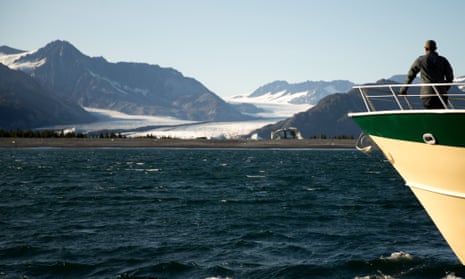Climate change is exerting “really scary” impacts on the Arctic with far-reaching consequences for the rest of the world, Barack Obama’s envoy for the region said on Friday.
Those changes, from melting sea ice to thawing permafrost and more frequent and severe storms, were leading the US and other countries to step up their presence in the remote and mineral-rich region, said Admiral Robert Papp, the State Department special representative for the Arctic.
Obama drew attention to a climate-changed Arctic during a visit to Alaska this week, hiking glaciers, cuddling husky puppies and visiting a remote indigenous community.
“It is really kind of scary to see some of the things that are happening – whether it’s damage to villages, the changes in the Arctic we have been talking about earlier, but also when we are talking about some of the significant weather events and the unpredictability of things happening around the world,” Papp told a conference call with reporters on Friday.
“Those two ice caps, in the Arctic and the Antarctic, provide cooling, affect ocean currents, winds and the atmosphere, and as we begin to lose those things I think we should all be concerned.”
The admiral’s comments come as US scientists said that the extent of sea ice in the Arctic – which is falling as climate change takes hold – is likely to be the fourth-lowest on record this year.
The US sought to use Obama’s visit, and a foreign ministers’ meeting in Anchorage, to press for stronger action on climate change, shepherding a declaration in support of a global warming deal to be negotiated at Paris later this year.
The joint statement from the foreign ministers also urged measures to reduce black carbon, or soot, one of the most powerful drivers of climate change. However, China, which was an observer at the meeting, did not sign.
Some fear a melting Arctic – opening up vast reserves of oil and gas, and potential shipping lanes – could set off a scramble for resources between the US, Canada, Russia and other countries seeking a greater stake in the region.
Obama this week came under criticism for allowing Shell to hunt for oil in Arctic waters. John Kerry, the secretary of state, defended the decision, arguing the leases were granted before Obama became president. “So the leases existed, and Shell and other companies are going to be drilling somewhere over the course of these next years, because we’re not going to suddenly be weaned from oil,” he told Huffington Post.
The US also moved to step up its own foothold in the Arctic, with Obama bringing forward the commissioning of a new icebreaker.
About half of the Arctic coastline is controlled by Russia. Papp acknowledged that Russia had been building up its presence in the region but said that so far its efforts seemed “reasonable”.
“The military buildup that I have seen does not seem to be at the level of the time of the Soviet Union but there are some activities that occurred at the time of the former Soviet Union that seem to be restored, whether it’s bases, or airfield capability, etc,” he said. “But once again those things can be used for dual purposes. They can be used for military operations, or they can be used for search and rescue.”
He went on: “I am not alarmed by anything that I have seen.”

Comments (…)
Sign in or create your Guardian account to join the discussion